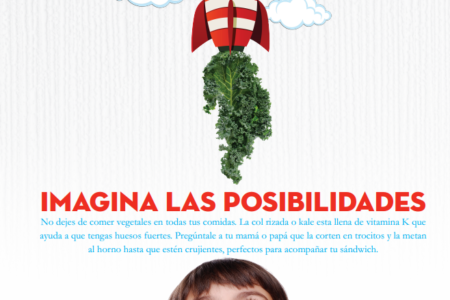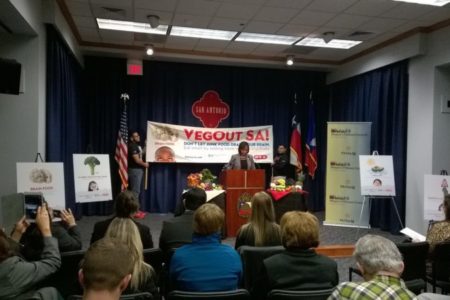Share On Social!

Science backs up your mom’s old adage: “Eat your fruits and vegetables if you want to be healthy and strong!” Unfortunately, this message is often lost or unheeded, buried beneath junk food ads relentlessly targeting kids, especially Latinos. Leaders in San Antonio, Texas decided to combat the city’s troubling obesity rate with a campaign designed to get kids (and their parents!) to eat more fruits and veggies. The “Veg Out” campaign, backed by science and a diverse coalition of public health, school, city, and other officials, aims to have a lasting impact on the health of families in San Antonio.
EMERGENCE
Awareness: San Antonio is a unique, mostly Latino city known for its rich culture and traditions.
However, some cultural traditions, like the consumption of not-so-healthy foods and drinks have given the city a less-than-desirable distinction: San Antonio is reported to be one of the most obese cities in the US, with 65% of adults being overweight or obese.
Although recent data points to a decline in local obesity rates, it remains a critical health problem that can lead to other conditions like heart disease and diabetes.
Former mayor Julian Castro created the San Antonio Mayor’s Fitness Council (MFC) in 2010 with the mission to lead San Antonio to be one of the healthiest and most active communities in the nation. He envisioned a city in which residents, groups, and organizations work collaboratively to achieve targeted health and fitness goals.
Since its start, the MFC has been leading the charge to get San Antonio residents moving more and eating better. They have developed a student ambassador program for youth to promote health and fitness in their schools and local communities, conducted Healthy Schools Summits where San Antonio’s school districts gather to discuss health and wellness, offered free group exercise classes in city parks, and trained San Antonio residents to lead neighborhood walking groups.
They wanted to do more to positively influence local families.
Learn: In 2013, the MFC began researching proven ways to further boost population health.
They found ample scientific evidence, including that of the Harvard School of Public Health, that consistently supports the conclusion that eating more fruits and vegetables is good for health and can lower the risk of heart disease and stroke.
The MFC found local data that 63.6% of San Antonio adults ate less than one serving of fruit and 21.1% ate less than one serving of vegetables a day. Additionally, San Antonio high-school students were not any more likely to eat more than one serving of fruits or vegetables a day, either, surveys showed.
Frame Issue: The MFC began brainstorming ways to encourage the San Antonio community to add more fruits and vegetables (and thus less junk) in their diets.
They researched successful ways to increase fruit and veggie consumption and found that solutions are out there. Educational approaches have been used in several cities, like the bilingual “Move to Fruits and Vegetables” campaign in New York City.
The MFC considered their options and decided that a city-wide fruit and vegetable campaign would be an effective way to add more healthy color to residents’ plates.
The campaign was given the name, “Veg Out.”
DEVELOPMENT
Education/Mobilization: The MFC wanted to bring their eat-your-fruits-and-vegetables message to residents across the city, from children to adults.
They determined that Veg Out must somehow engage schools, workplaces and community organizations. They wanted to utilize social media, like Facebook, Twitter, and the existing FitCitySA.com, to expand their reach as well as traditional media like TV, radio and outdoor billboards.
Finding partners to support the campaign is paramount, MFC officials said.
San Antonio is home to many organizations that do valuable work in the community, and the MFC reached out to H-E-B grocery stores, the San Antonio Metro Health Department, the San Antonio Food Bank, the YMCA of Greater San Antonio, San Antonio Sports and many others to help inform and support the campaign.
Debate: The working group decided that they needed to bring in more diverse partners to make the campaign a success. Including only lawmakers or researchers or health professionals wouldn’t connect to the city as a whole.
So the MFC sought out and invited organizations that represented diverse racial and ethnic backgrounds, non-health professionals and community decision makers to join the working group. Everyone needed to be on board if San Antonio residents were going to become a city that embraced more fruits and vegetables.

The MFC decided on another way to ensure inclusion: bilingual material.
Because Latinos make up the majority of San Antonio residents, the campaign would require English and Spanish components.
ENACTMENT
Activation/Frame Policy: Veg Out leaders began crafting the campaign’s look and content.
Veg Out had to be catchy and memorable while promoting increased consumption and further learning for three very different groups: parents, kids, and businesses.
Months before the launch of Veg Out, the coalition got some great news.
Clear Channel Outdoor offered a one-for-one buy on all outdoor billboards, transit, and digital media purchases for the campaign, which would provide the campaign with thousands of dollars of free media. Having the support of a large business like Clear Channel Outdoor proved that Veg Out was already resounding with the community.

Change: On Feb. 24, 2015, the MFC held a press conference at San Antonio City Hall officially announcing Veg Out.
The components of Veg Out are as follows:
- School Contests: In elementary schools, with incentives of winning cash and a party.
- Employer Contests: Between local employers to see how they bring the “veg out” campaign to life on their campuses through their own food service operations, as well as employee wellness and benefits programs.
- Outdoor Advertising: On billboards, mass transit vehicles, and stations.
- Social Media Contests: Residents can upload photos via social network channels of their food art using the hashtag #vegout on Facebook and Twitter.
- Public Art Engagement: Challenge local artists to develop their own “veg out” public art installations to be bid on by local businesses and individuals in an online silent auction to help raise funds for the activities of the MFC.
“With this Campaign, we are fighting a host of chronic diseases, such as diabetes and obesity, by simply choosing to eat an extra apple a day, drink those delicious healthy smoothies, or add a side salad to your dinner,” said Mayor Taylor. “I would like to officially challenge all of our residents – our schools, worksites, community centers – to join together in 2015 and Veg Out San Antonio!”
With so many fun contests and creative advertising, Veg Out has the potential to be a new, healthy part of the San Antonio landscape.
IMPLEMENTATION
Implementation: Veg Out advertising and contests will begin rolling out in March 2015 and will run through May 2016.
The MFC is partnering with Recipe for Success, a non-profit out of Houston for a VegOut! 30 Ways in 30 Days Challenge in March to challenge everyone to try a different vegetable every day for 30 days.
To measure the campaign’s success, the MFC will evaluate Veg Out during summer 2017. They will collect data including the number of ads around the city, social media hits, and new followers, and workplaces, schools, community groups that promote the campaign.
But the purpose of Veg Out is to increase fruit and vegetable consumption, so the MFC will be evaluated, too.
Their goal is to reduce by at least 10% the number of adults who report eating less than one serving of fruits and less than one serving of vegetables a day. They also hope to increase by at least 10% the number of students who report eating one or more serving of fruits or vegetables a day.
Equity/Sustainability: The MFC believes that using diverse marketing approaches will ensure that they reach a broad audience across the community. Additionally, they hope it will allow them to target employers and school-aged children in communities that experience health disparities and higher levels of obesity and diabetes.
If Veg Out can successfully motivate San Antonio residents to add more apples, oranges, and broccoli to their plates, the city is on track to be known for something new: good health.
January, 6th, 2016 Update: The 2016 Veg Out! campaign has a new mobile phone app that allows campaign participants easily track their vegetable consumption in conjunction with the site vegoutwithrfs.org. This helps users of the phone app keep track of all the vegetables they have been trying and helps them win prizes!
The campaign’s launch will begin in March 2016 and will encourage participants to Veg Out for a thirty-day challenge.
To find out more click here!
This success story was produced by Salud America! with support from the Robert Wood Johnson Foundation.
The stories are intended for educational and informative purposes. References to specific policymakers, individuals, schools, policies, or companies have been included solely to advance these purposes and do not constitute an endorsement, sponsorship, or recommendation. Stories are based on and told by real community members and are the opinions and views of the individuals whose stories are told. Organization and activities described were not supported by Salud America! or the Robert Wood Johnson Foundation and do not necessarily represent the views of Salud America! or the Robert Wood Johnson Foundation.
ABOUT THE PROGRAM
Salud America! The RWJF Research Network to Prevent Obesity Among Latino Children is a national program of the Robert Wood Johnson Foundation. The program aims to educate researchers, decision-makers, community leaders, and the public in contributing toward healthier Latino communities and seeking environmental and policy solutions to the epidemic of Latino childhood obesity. The network is directed by the Institute for Health Promotion Research at the University of Texas Health Science Center at San Antonio.
For more information, visit http://www.salud-america.org.
Explore More:
Healthy Neighborhoods & CommunitiesBy The Numbers
1
Supermarket
for every Latino neighborhood, compared to 3 for every non-Latino neighborhood
This success story was produced by Salud America! with support from the Robert Wood Johnson Foundation.
The stories are intended for educational and informative purposes. References to specific policymakers, individuals, schools, policies, or companies have been included solely to advance these purposes and do not constitute an endorsement, sponsorship, or recommendation. Stories are based on and told by real community members and are the opinions and views of the individuals whose stories are told. Organization and activities described were not supported by Salud America! or the Robert Wood Johnson Foundation and do not necessarily represent the views of Salud America! or the Robert Wood Johnson Foundation.



